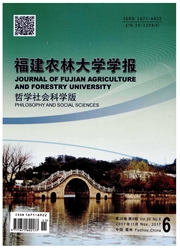

 中文摘要:
中文摘要:
基于LMDI模型和Tapio脱钩模型,探索中国工业部门碳排放变化和碳排放强度的关键影响因子,研究结论为:能源结构效应、能源效率效应、产出规模效应对工业部门碳排放增长的累积贡献率分别为-0.78%、-78.14%和178.93%;能耗与工业增加值脱钩弹性对碳排放与工业增加值脱钩弹性呈正向影响并起决定性作用.根据以上结论,提出工业部门低碳转型的3大战略:优化能源消费结构是工业低碳转型的战略方向,提升能源效率是工业低碳转型的战略路径,调整产业结构是工业低碳转型的可取之路.
 英文摘要:
英文摘要:
Based on the LMDI model and Tapio decoupling model, the key factors affecting carbon emission change and carbon emis- sion intensity of the Chinab industrial-sectors are explored. The results show that the cumulative contribution rates to the growth of car- bon emission intensity of the China' s industrial-sectors being from energy structural effect, energy efficiency affect, output scale effect are respectively-0. 78%, -78. 14% and 178.93% ; and the decoupllng elasticity between energy consumption and industrial added value has a positive and determinant role on the deeoupling elasticity between carbon emission and industrial added value. Accordingly three major strategies for industrial-sectors low-carbon transition are proposed as follows, optimizing energy consumption structure is the strategic direction, improving energy efficiency is the strategic path, adjusting the industrial structure is the desirable measure.
 同期刊论文项目
同期刊论文项目
 同项目期刊论文
同项目期刊论文
 期刊信息
期刊信息
